IP
-
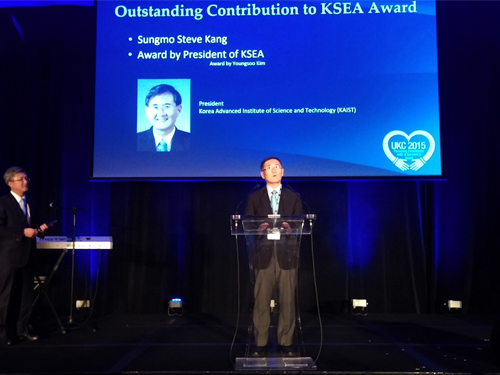 President Steve Kang of KAIST Receives the Outstanding Contribution Award from the Korean-American Scientists and Engineers Association
The Korean-American Scientists and Engineers Association (KSEA), a non-profit Korean professional organization based in the United States with over 6,000 registered members, bestowed upon President Steve Kang of KAIST the 2015 Outstanding Contribution Award.
The award is presented to a person who has made significant contributions to the development of KSEA.
The award ceremony took place during the 2015 US-Korea Conference on Science, Technology, and Entrepreneurship (UKC), which was held on July 30, 2015, at the Hyatt Regency Hotel in Atlanta, Georgia.
The UKC is the flagship conference of KSEA, which takes place every year, and covers science, engineering, technology, industry, entrepreneurship, and leadership. It attracts more than 1,200 participants from the US and Korea. The UKC 2015 was held on July 29-August 1, 2015.
President Kang has participated in UKC conferences over the past few years as a plenary speaker, addressing major issues in science and technology for both nations, and provided generous support for the activities of UKC and KSEA. He also promoted discussions and exchanges of professional knowledge in his field, microelectronics, by organizing fora and symposia.
He addressed the UKC 2015 as a plenary speaker with a speech entitled “Pursuing Excellence with a Servant’s Heart.” President Kang said that good leadership should bring out synergistic contributions from all constituents and achieve excellence under all circumstances. He mentioned one example of good leadership, known as humble leadership, and explained how such leadership played an important role in the development of scientific breakthroughs, such as the world’s premier high-end microprocessor chip sets first produced by his team under extremely high pressure.
2015.08.05 View 9682
President Steve Kang of KAIST Receives the Outstanding Contribution Award from the Korean-American Scientists and Engineers Association
The Korean-American Scientists and Engineers Association (KSEA), a non-profit Korean professional organization based in the United States with over 6,000 registered members, bestowed upon President Steve Kang of KAIST the 2015 Outstanding Contribution Award.
The award is presented to a person who has made significant contributions to the development of KSEA.
The award ceremony took place during the 2015 US-Korea Conference on Science, Technology, and Entrepreneurship (UKC), which was held on July 30, 2015, at the Hyatt Regency Hotel in Atlanta, Georgia.
The UKC is the flagship conference of KSEA, which takes place every year, and covers science, engineering, technology, industry, entrepreneurship, and leadership. It attracts more than 1,200 participants from the US and Korea. The UKC 2015 was held on July 29-August 1, 2015.
President Kang has participated in UKC conferences over the past few years as a plenary speaker, addressing major issues in science and technology for both nations, and provided generous support for the activities of UKC and KSEA. He also promoted discussions and exchanges of professional knowledge in his field, microelectronics, by organizing fora and symposia.
He addressed the UKC 2015 as a plenary speaker with a speech entitled “Pursuing Excellence with a Servant’s Heart.” President Kang said that good leadership should bring out synergistic contributions from all constituents and achieve excellence under all circumstances. He mentioned one example of good leadership, known as humble leadership, and explained how such leadership played an important role in the development of scientific breakthroughs, such as the world’s premier high-end microprocessor chip sets first produced by his team under extremely high pressure.
2015.08.05 View 9682 -
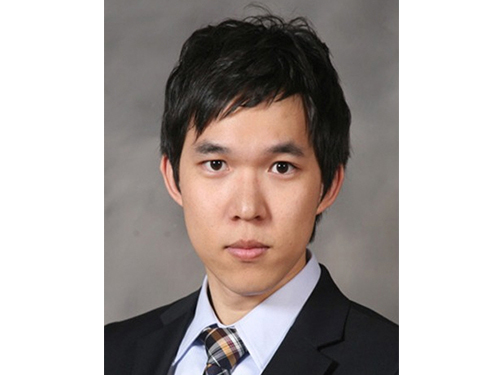 Dong-Young Lee, a Doctoral Candidate, Receives the Best Paper Award
Dong-Young Lee, a Ph.D. candidate in the Mechanical Engineering Department, KAIST, received the Best Paper Award at the 18th International Conference on Composite Structures (ICCS). The event was held in Lisbon, Portugal, on June 15-18, 2015. Mr. Lee’s adviser is Professor Dai-Gil Lee of the same department.
The ICCS is held every other year, and is one of the largest and long-established conferences on composite materials and structures in the world. At this year’s conference, a total of 680 papers were presented, among which, two papers were chosen for the Best Paper Award, including Mr. Lee’s.
The paper, entitled “Gasket-integrated Carbon and Silicon Elastomer Composite Bipolar Plate for High-temperature PEMFC,” will be published in the September issue of Composite Structures which is one of the top journals in mechanical engineering as judged by the Google Scholar Metrics rankings.
Mr. Lee dropped the conventional method of PEMFC (Proton Exchange Membrane Fuel Cells) assembly and instead developed a gasket-integrated carbon and silicone elastomer composite bipolar plate. This technology significantly increased the energy efficiency of fuel cells and their productivity.
Mr. Lee said, “I would like to thank the many people who supported me, especially my Ph.D. adviser, Professor Dai-Gil Lee. Without their encouragement, I would have not won this award. I hope my research will contribute to solving energy problems in the future.”
In addition, Professor Joon-Woo Im from Chonbuk National University, Senior Researcher Il-Bum Choi from the Agency for Defense Development, and a fellow doctoral candidate Soo-Hyun Nam from KAIST participated in this research project.
2015.07.09 View 12354
Dong-Young Lee, a Doctoral Candidate, Receives the Best Paper Award
Dong-Young Lee, a Ph.D. candidate in the Mechanical Engineering Department, KAIST, received the Best Paper Award at the 18th International Conference on Composite Structures (ICCS). The event was held in Lisbon, Portugal, on June 15-18, 2015. Mr. Lee’s adviser is Professor Dai-Gil Lee of the same department.
The ICCS is held every other year, and is one of the largest and long-established conferences on composite materials and structures in the world. At this year’s conference, a total of 680 papers were presented, among which, two papers were chosen for the Best Paper Award, including Mr. Lee’s.
The paper, entitled “Gasket-integrated Carbon and Silicon Elastomer Composite Bipolar Plate for High-temperature PEMFC,” will be published in the September issue of Composite Structures which is one of the top journals in mechanical engineering as judged by the Google Scholar Metrics rankings.
Mr. Lee dropped the conventional method of PEMFC (Proton Exchange Membrane Fuel Cells) assembly and instead developed a gasket-integrated carbon and silicone elastomer composite bipolar plate. This technology significantly increased the energy efficiency of fuel cells and their productivity.
Mr. Lee said, “I would like to thank the many people who supported me, especially my Ph.D. adviser, Professor Dai-Gil Lee. Without their encouragement, I would have not won this award. I hope my research will contribute to solving energy problems in the future.”
In addition, Professor Joon-Woo Im from Chonbuk National University, Senior Researcher Il-Bum Choi from the Agency for Defense Development, and a fellow doctoral candidate Soo-Hyun Nam from KAIST participated in this research project.
2015.07.09 View 12354 -
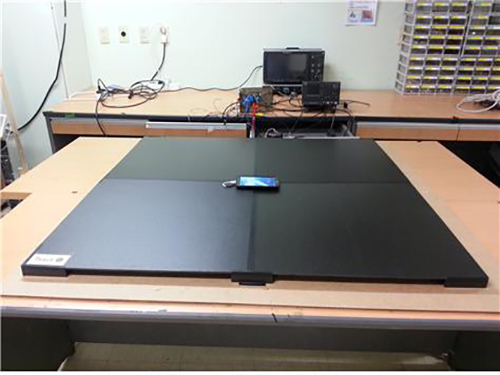 Omnidirectional Free Space Wireless Charging Developed
The simultaneous charging of multiple mobile devices at 0.5 meter away from the power source is now possible under the international electromagnetic field guidelines.
Mobile devices, such as smartphones and laptops, have become indispensable portable items in modern life, but one big challenge remains to fully enjoying these devices: keeping their batteries charged.
A group of researchers at KAIST has developed a wireless-power transfer (WPT) technology that allows mobile devices to be charged at any location and in any direction, even if the devices are away from the power source, just as Wi-Fi works for Internet connections. With this technology, so long as mobile users stay in a designated area where the charging is available, e.g., the Wi-Power zone, the device, without being tethered to a charger, will pick up power automatically, as needed.
The research team led by Professor Chun T. Rim of the Nuclear and Quantum Engineering Department at KAIST has made great strides in WPT development. Their WPT system is capable of charging multiple mobile devices concurrently and with unprecedented freedom in any direction, even while holding the devices in midair or a half meter away from the power source, which is a transmitter. The research result was published in the June 2015 on-line issue of IEEE Transactions on Power Electronics, which is entitled “Six Degrees of Freedom Mobile Inductive Power Transfer by Crossed Dipole Tx (Transmitter) and Rx (Receiver) Coils.”
Professor Rim’s team has successfully showcased the technology on July 7, 2015 at a lab on KAIST’s campus. They used high-frequency magnetic materials in a dipole coil structure to build a thin, flat transmitter (Tx) system shaped in a rectangle with a size of 1m2. Either 30 smartphones with a power capacity of one watt each or 5 laptops with 2.4 watts each can be simultaneously and wirelessly charged at a 50 cm distance from the transmitter with six degrees of freedom, regardless of the devices’ three-axes positions and directions. This means that the device can receive power all around the transmitter in three-dimensional space. The maximum power transfer efficiency for the laptops was 34%. The researchers said that to fabricate plane Tx and Rx coils with the six-degree-of-freedom characteristic was a bottleneck of WPT for mobile applications.
Dipole Coil Resonance System (DCRS)
The research team used the Dipole Coil Resonance System (DCRS) to induce magnetic fields, which was developed by the team in 2014 for inductive power transfer over an extended distance. The DCRS is composed of two (transmitting and receiving) magnetic dipole coils, placed in parallel, with each coil having a ferrite core and connected with a resonant capacitor. Comparing to a conventional loop coil, the dipole coil is very compact and has a less dimension. Therefore, a crossed dipole structure has 2-dimension rather than 3-dimension of a crossed loop coil structure. The DCRS has a great advantage to transfer power even when the resonance frequency changes in the range of 1% (Q factor is below 100). The ferrite cores are optimally designed to reduce the core volume by half, and their ability to transfer power is nearly unaffected by human bodies or surrounding metal objects, making DCRS ideal to transmit wireless power in emergency situations. In a test conducted in 2014, Professor Rim succeeded in transferring 209 watts of power wirelessly to the distance of five meters. (See KAIST’s press release on DCRS for details: http://www.eurekalert.org/pub_releases/2014-04/tkai-wpt041714.php.)
Greater Flexibility and Safer Charging
The research team rearranged the two dipole coils from a parallel position to cross them in order to generate rotating magnetic fields, which was embedded in the Tx’s flat platform. This has made it possible for mobile devices to receive power from any direction.
Although wireless-power technology has been applied to smartphones, it could not offer any substantial advantages over traditional wired charging because the devices still require close contact with the transmitter, a charging pad. To use the devices freely and safely, including in public spaces, the WPT technology should provide mobile users with six degrees of freedom at a distance. Until now, all wireless-charging technologies have had difficulties with the problem of short charging distance, mostly less than 10 cm, as well as charging conditions that the devices should be placed in a fixed position. For example, the Galaxy S6 could only be charged wirelessly in a fixed position, having one degree of freedom. The degree of freedom represents mobile devices’ freedom of movement in three-dimensional space.
In addition, the DCRS works at a low magnetic field environment. Based on the magnetic flux shielding technology developed by the research team, the level of magnetic flux is below the safety level of the International Commission on Non-Ionizing Radiation Protection (ICNIRP) guideline (27µT) for general public exposure to electromagnetic field (EMF).
Professor Rim said, “Our transmitter system is safe for humans and compatible with other electronic devices. We have solved three major issues of short charging distance, the dependence on charging directions, and plane coil structures of both Tx and Rx, which have blocked the commercialization of WPT.”
Currently, the research team and KAIST’s spin-off company, TESLAS, Inc., have been conducting pilot projects to apply DCRS in various places such as cafes and offices.
YouTube Link: https://www.youtube.com/watch?v=JU64pMyJioc
Demonstration of 30 Watts Range Omnidirectional Wireless-charging at a Laboratory on KAIST’s Campus
Figure 1: Wide-range omnidirectional wireless-charging system based on DCRS can charge multiple numbers of mobile devices simultaneously in a 1m3 range. The above is a transmitter, and the below is a Samsung Galaxy Note with a receiver embedded inside.
Figure 2: Demonstration of the omnidirectional wireless-charging system (clockwise from top of the left, robust charging despite the presence of metal obstacles, omnidirectional charging, long distance charging, and multiple devices charging)
2015.07.08 View 18024
Omnidirectional Free Space Wireless Charging Developed
The simultaneous charging of multiple mobile devices at 0.5 meter away from the power source is now possible under the international electromagnetic field guidelines.
Mobile devices, such as smartphones and laptops, have become indispensable portable items in modern life, but one big challenge remains to fully enjoying these devices: keeping their batteries charged.
A group of researchers at KAIST has developed a wireless-power transfer (WPT) technology that allows mobile devices to be charged at any location and in any direction, even if the devices are away from the power source, just as Wi-Fi works for Internet connections. With this technology, so long as mobile users stay in a designated area where the charging is available, e.g., the Wi-Power zone, the device, without being tethered to a charger, will pick up power automatically, as needed.
The research team led by Professor Chun T. Rim of the Nuclear and Quantum Engineering Department at KAIST has made great strides in WPT development. Their WPT system is capable of charging multiple mobile devices concurrently and with unprecedented freedom in any direction, even while holding the devices in midair or a half meter away from the power source, which is a transmitter. The research result was published in the June 2015 on-line issue of IEEE Transactions on Power Electronics, which is entitled “Six Degrees of Freedom Mobile Inductive Power Transfer by Crossed Dipole Tx (Transmitter) and Rx (Receiver) Coils.”
Professor Rim’s team has successfully showcased the technology on July 7, 2015 at a lab on KAIST’s campus. They used high-frequency magnetic materials in a dipole coil structure to build a thin, flat transmitter (Tx) system shaped in a rectangle with a size of 1m2. Either 30 smartphones with a power capacity of one watt each or 5 laptops with 2.4 watts each can be simultaneously and wirelessly charged at a 50 cm distance from the transmitter with six degrees of freedom, regardless of the devices’ three-axes positions and directions. This means that the device can receive power all around the transmitter in three-dimensional space. The maximum power transfer efficiency for the laptops was 34%. The researchers said that to fabricate plane Tx and Rx coils with the six-degree-of-freedom characteristic was a bottleneck of WPT for mobile applications.
Dipole Coil Resonance System (DCRS)
The research team used the Dipole Coil Resonance System (DCRS) to induce magnetic fields, which was developed by the team in 2014 for inductive power transfer over an extended distance. The DCRS is composed of two (transmitting and receiving) magnetic dipole coils, placed in parallel, with each coil having a ferrite core and connected with a resonant capacitor. Comparing to a conventional loop coil, the dipole coil is very compact and has a less dimension. Therefore, a crossed dipole structure has 2-dimension rather than 3-dimension of a crossed loop coil structure. The DCRS has a great advantage to transfer power even when the resonance frequency changes in the range of 1% (Q factor is below 100). The ferrite cores are optimally designed to reduce the core volume by half, and their ability to transfer power is nearly unaffected by human bodies or surrounding metal objects, making DCRS ideal to transmit wireless power in emergency situations. In a test conducted in 2014, Professor Rim succeeded in transferring 209 watts of power wirelessly to the distance of five meters. (See KAIST’s press release on DCRS for details: http://www.eurekalert.org/pub_releases/2014-04/tkai-wpt041714.php.)
Greater Flexibility and Safer Charging
The research team rearranged the two dipole coils from a parallel position to cross them in order to generate rotating magnetic fields, which was embedded in the Tx’s flat platform. This has made it possible for mobile devices to receive power from any direction.
Although wireless-power technology has been applied to smartphones, it could not offer any substantial advantages over traditional wired charging because the devices still require close contact with the transmitter, a charging pad. To use the devices freely and safely, including in public spaces, the WPT technology should provide mobile users with six degrees of freedom at a distance. Until now, all wireless-charging technologies have had difficulties with the problem of short charging distance, mostly less than 10 cm, as well as charging conditions that the devices should be placed in a fixed position. For example, the Galaxy S6 could only be charged wirelessly in a fixed position, having one degree of freedom. The degree of freedom represents mobile devices’ freedom of movement in three-dimensional space.
In addition, the DCRS works at a low magnetic field environment. Based on the magnetic flux shielding technology developed by the research team, the level of magnetic flux is below the safety level of the International Commission on Non-Ionizing Radiation Protection (ICNIRP) guideline (27µT) for general public exposure to electromagnetic field (EMF).
Professor Rim said, “Our transmitter system is safe for humans and compatible with other electronic devices. We have solved three major issues of short charging distance, the dependence on charging directions, and plane coil structures of both Tx and Rx, which have blocked the commercialization of WPT.”
Currently, the research team and KAIST’s spin-off company, TESLAS, Inc., have been conducting pilot projects to apply DCRS in various places such as cafes and offices.
YouTube Link: https://www.youtube.com/watch?v=JU64pMyJioc
Demonstration of 30 Watts Range Omnidirectional Wireless-charging at a Laboratory on KAIST’s Campus
Figure 1: Wide-range omnidirectional wireless-charging system based on DCRS can charge multiple numbers of mobile devices simultaneously in a 1m3 range. The above is a transmitter, and the below is a Samsung Galaxy Note with a receiver embedded inside.
Figure 2: Demonstration of the omnidirectional wireless-charging system (clockwise from top of the left, robust charging despite the presence of metal obstacles, omnidirectional charging, long distance charging, and multiple devices charging)
2015.07.08 View 18024 -
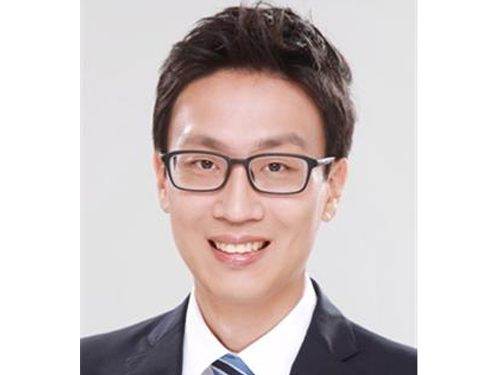 Professor Kyoungsik Yu Receives the Young IT Engineer Award from IEEE and IEIE of Korea
Professor Kyoungsik Yu of KAIST’s Department of Electrical Engineering is the recipient of this year’s Young IT (Information Technology) Engineer Award that was co-hosted by the Institute of Electrical and Electronics Engineers (IEEE), the Institute of Electronics Engineers of Korea (IEIE), and Haedong Science Culture Foundation in Korea. The award was presented on June 22, 2015 at The Ramada Plaza Jeju Hotel on Jeju Island, Korea.
The Young IT Engineer Award is given to emerging scientists who have made significant contributions to the advancement of technology, society, environment, and creative education.
Professor Yu's main research interests are IT, energy, and imaging through miniaturization and integration of optoelectronic devices. His contribution to academic and technological development is reflected in his publication of more than 100 papers in international journals and conferences, which were cited over 2,200 times.
Professor Yu said, “I’m honored to receive this award and am encouraged by it. I also find the award meaningful because the United Nations has designated this year as the “International Year of Light and Light-based Technologies,” the field I have been involved in as a researcher.”
In addition to Korea, the IEEE has jointly hosted and presented this award to researchers in countries such as Chile, Ecuador, Peru, Singapore, and Italy.
2015.06.22 View 15447
Professor Kyoungsik Yu Receives the Young IT Engineer Award from IEEE and IEIE of Korea
Professor Kyoungsik Yu of KAIST’s Department of Electrical Engineering is the recipient of this year’s Young IT (Information Technology) Engineer Award that was co-hosted by the Institute of Electrical and Electronics Engineers (IEEE), the Institute of Electronics Engineers of Korea (IEIE), and Haedong Science Culture Foundation in Korea. The award was presented on June 22, 2015 at The Ramada Plaza Jeju Hotel on Jeju Island, Korea.
The Young IT Engineer Award is given to emerging scientists who have made significant contributions to the advancement of technology, society, environment, and creative education.
Professor Yu's main research interests are IT, energy, and imaging through miniaturization and integration of optoelectronic devices. His contribution to academic and technological development is reflected in his publication of more than 100 papers in international journals and conferences, which were cited over 2,200 times.
Professor Yu said, “I’m honored to receive this award and am encouraged by it. I also find the award meaningful because the United Nations has designated this year as the “International Year of Light and Light-based Technologies,” the field I have been involved in as a researcher.”
In addition to Korea, the IEEE has jointly hosted and presented this award to researchers in countries such as Chile, Ecuador, Peru, Singapore, and Italy.
2015.06.22 View 15447 -
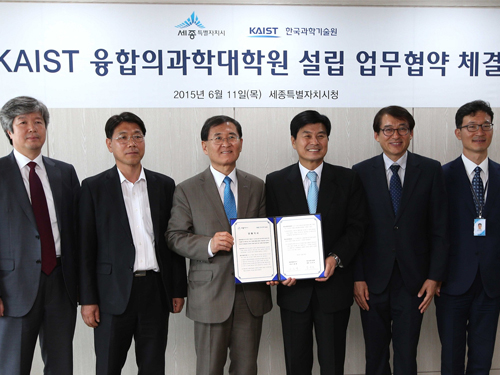 KAIST and Sejong City Goverment Agree to Establish a Graduate School of Medical Science and Engineering
KAIST and the government of Sejong City will cooperate to establish a graduate school of medical science and engineering. On June 11, 2015, President Steve Kang of KAIST and Mayor Choon-Hee Lee of Sejong City signed a memorandum of understanding at the city hall of Sejong to establish the school.
Under the agreement, the two organizations will work out details to establish the graduate school in Sejong on such issues as administrative assistance, financial support, curriculum development, and the creation of an environment conducive to the growth of medical science.
President Kang said, “Once this graduate school is established, KAIST will be able to offer Korea and the world top-notch researchers in the field of medical science. I have high hopes that the school will produce high-impact research breakthroughs and lead in the advancement of interdisciplinary studies in biotechnology.”
In the picture below, President Steve Kang of KAIST (third from the left) holds the signed memorandum of understanding with Mayor Choon-Hee Lee of Sejong (fourth from the left).
2015.06.16 View 8208
KAIST and Sejong City Goverment Agree to Establish a Graduate School of Medical Science and Engineering
KAIST and the government of Sejong City will cooperate to establish a graduate school of medical science and engineering. On June 11, 2015, President Steve Kang of KAIST and Mayor Choon-Hee Lee of Sejong City signed a memorandum of understanding at the city hall of Sejong to establish the school.
Under the agreement, the two organizations will work out details to establish the graduate school in Sejong on such issues as administrative assistance, financial support, curriculum development, and the creation of an environment conducive to the growth of medical science.
President Kang said, “Once this graduate school is established, KAIST will be able to offer Korea and the world top-notch researchers in the field of medical science. I have high hopes that the school will produce high-impact research breakthroughs and lead in the advancement of interdisciplinary studies in biotechnology.”
In the picture below, President Steve Kang of KAIST (third from the left) holds the signed memorandum of understanding with Mayor Choon-Hee Lee of Sejong (fourth from the left).
2015.06.16 View 8208 -
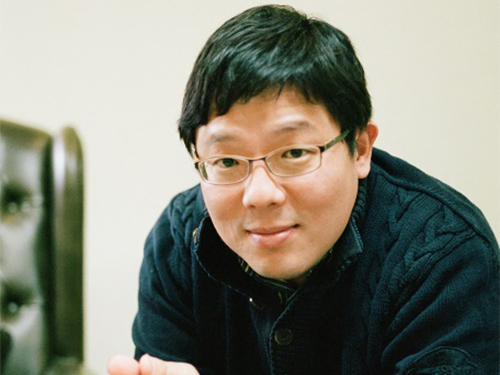 Science and Technology Policy Professor Chihyung Jeon Awarded Rachel Carson Fellowship
KAIST Graduate School of Science and Technology Policy Professor Chihyung Jeon has been awarded the Rachel Carson Fellowship 2015-2016.
Rachel Carson Center for Environment and Society is a research center for environmental humanities and social sciences, supported by the German Federal Ministry of Education and Research. It was founded by Ludwig-Maximilians-Universität, Munich, Germany and the Deutsches Museum as a joint initiative in 2009.
Rachel Carson Center supports researches in humanities and social sciences on the interactions between the environment and the society, following the footsteps of Rachel Cason, who raised awareness on the chemical environmental damage and started global environmental movement through her published book “Silent Spring” in 1962.
The center is awarding Rachel Carson Fellowships to established researchers to fund their writing and promote exchange of research. This year, 31 fellowships were awarded.
Professor Jeon will conduct research on "A Dredged Nation: The Four Rivers Restoration Project and the Envirotechnical Transformation of South Korea" and will also hold an additional post of International Curatorial Fellow at the Deutsches Museum.
2015.06.11 View 12648
Science and Technology Policy Professor Chihyung Jeon Awarded Rachel Carson Fellowship
KAIST Graduate School of Science and Technology Policy Professor Chihyung Jeon has been awarded the Rachel Carson Fellowship 2015-2016.
Rachel Carson Center for Environment and Society is a research center for environmental humanities and social sciences, supported by the German Federal Ministry of Education and Research. It was founded by Ludwig-Maximilians-Universität, Munich, Germany and the Deutsches Museum as a joint initiative in 2009.
Rachel Carson Center supports researches in humanities and social sciences on the interactions between the environment and the society, following the footsteps of Rachel Cason, who raised awareness on the chemical environmental damage and started global environmental movement through her published book “Silent Spring” in 1962.
The center is awarding Rachel Carson Fellowships to established researchers to fund their writing and promote exchange of research. This year, 31 fellowships were awarded.
Professor Jeon will conduct research on "A Dredged Nation: The Four Rivers Restoration Project and the Envirotechnical Transformation of South Korea" and will also hold an additional post of International Curatorial Fellow at the Deutsches Museum.
2015.06.11 View 12648 -
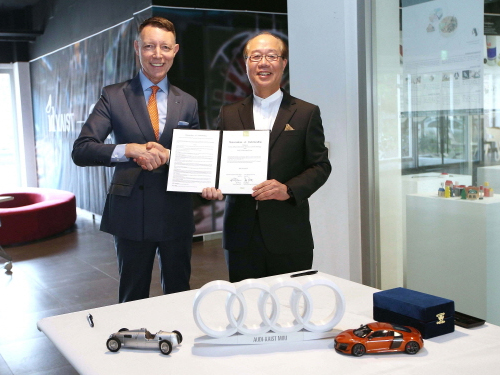 KAIST and Audi Korea Sign a Memorandum of Understanding to Establish a Startup Incubator
For the next five years, Audi Korea will provide USD 250,000 for the startup program.
KAIST recently signed a memorandum of understanding (MOU) with Audi Korea to establish a student-led startup program, the Audi-KAIST Innovation Lounge, to promote design and product development on May 19, 2015, at the KAIST Institute of Entrepreneurship on campus.
Directed by Professor Sang-Min Bae of the Industrial Design Department (IDD), the Audi-KAIST Innovation Lounge will operate a global business incubator where IDD undergraduate and graduate students cultivate their entrepreneurship skills and explore business opportunities to develop commercially-applicable product designs. Audi Korea will invest USD 250,000 in the Innovation Lounge project for the next five years.
Students will receive support from the Lounge to turn their ideas, class assignments, and graduation theses into business products through a full cycle of the product development process such as inquiry, prototype development, and commercialization. The Lounge will also provide students with mentoring services from industry professionals and experts who can assist the students in finding design solutions and building prototypes using 3D printers.
The Dean of IDD, Kun-Pyo Lee, said, “Audi has been known for its initiatives which blend technological innovations into design. Likewise, our department offers students an integrative approach to design education and research which incorporates human factors and technology as important features in the design process. I believe that the Audi-KAIST Innovation Lounge will help us lead such efforts in the future.”
Professor Bae added, “This MOU is quite significant because it shows an excellent collaboration between academia and industry. Ideas created in universities should not be left to languish as just an idea or research. Rather, they should be utilized as ways to serve the needs of our society, and to do so, it is important for the government and companies to pay more attention to these interactions taking place between academia and private sectors.”
The Head of Marketing at Audi Korea, Jorg Dietzel, said, “As seen in our corporate slogan, "Advancement through Technology," Audi has grown through numerous technological innovations. I hope Audi Korea can contribute to the support of KAIST students from the Industrial Design Department to realize their dreams as future entrepreneurs and bring more innovative ideas to their field.”
Picture: Jorg Dietzel (fifth from the left), the Head of Marketing at Audi Korea, and Kun-Pyo Lee (sixth from the left), the Dean of Industrial Design Department, KAIST, pose together right after signing an agreement to create the Audi-KAIST Innovation Lounge on May 19, 2015.
2015.05.22 View 11885
KAIST and Audi Korea Sign a Memorandum of Understanding to Establish a Startup Incubator
For the next five years, Audi Korea will provide USD 250,000 for the startup program.
KAIST recently signed a memorandum of understanding (MOU) with Audi Korea to establish a student-led startup program, the Audi-KAIST Innovation Lounge, to promote design and product development on May 19, 2015, at the KAIST Institute of Entrepreneurship on campus.
Directed by Professor Sang-Min Bae of the Industrial Design Department (IDD), the Audi-KAIST Innovation Lounge will operate a global business incubator where IDD undergraduate and graduate students cultivate their entrepreneurship skills and explore business opportunities to develop commercially-applicable product designs. Audi Korea will invest USD 250,000 in the Innovation Lounge project for the next five years.
Students will receive support from the Lounge to turn their ideas, class assignments, and graduation theses into business products through a full cycle of the product development process such as inquiry, prototype development, and commercialization. The Lounge will also provide students with mentoring services from industry professionals and experts who can assist the students in finding design solutions and building prototypes using 3D printers.
The Dean of IDD, Kun-Pyo Lee, said, “Audi has been known for its initiatives which blend technological innovations into design. Likewise, our department offers students an integrative approach to design education and research which incorporates human factors and technology as important features in the design process. I believe that the Audi-KAIST Innovation Lounge will help us lead such efforts in the future.”
Professor Bae added, “This MOU is quite significant because it shows an excellent collaboration between academia and industry. Ideas created in universities should not be left to languish as just an idea or research. Rather, they should be utilized as ways to serve the needs of our society, and to do so, it is important for the government and companies to pay more attention to these interactions taking place between academia and private sectors.”
The Head of Marketing at Audi Korea, Jorg Dietzel, said, “As seen in our corporate slogan, "Advancement through Technology," Audi has grown through numerous technological innovations. I hope Audi Korea can contribute to the support of KAIST students from the Industrial Design Department to realize their dreams as future entrepreneurs and bring more innovative ideas to their field.”
Picture: Jorg Dietzel (fifth from the left), the Head of Marketing at Audi Korea, and Kun-Pyo Lee (sixth from the left), the Dean of Industrial Design Department, KAIST, pose together right after signing an agreement to create the Audi-KAIST Innovation Lounge on May 19, 2015.
2015.05.22 View 11885 -
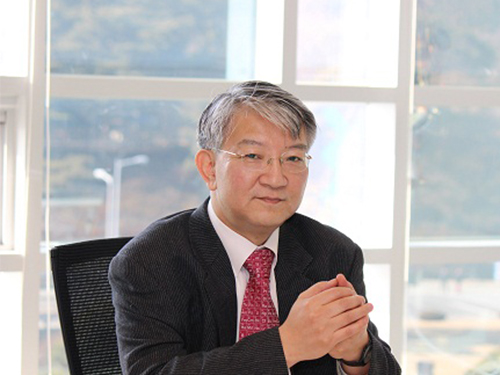 Professor Sang-Yup Lee Receives the Order of Service Merit Red Stripes from the Korean Government
The government of the Republic of Korea named Professor Sang-Yup Lee of the Department of Chemical and Bio-molecular Engineering at KAIST as the fiftieth recipient of the Order of Service Merit Red Stripes on May 19, 2015.
This medal is awarded to government employees, officials, and teachers in recognition of their contributions to public services including education.
Professor Lee is regarded as a leading scientist in the field of metabolic engineering, genomics, proteomics, metabolomics, and bioinformatics on microorganism producing various primary and secondary metabolites. He contributed significantly to the advancement of bio-based engineering research in Korea.
In addition, his research in microorganism metabolic engineering propelled him to the front of his field, making him the world’s founder of systems metabolic engineering, inventing numerous technologies in strain development.
Professor Lee has received many patent rights in bioprocess engineering. While at KAIST, he applied for 585 patents and registered 227 patents. In particular, he has applied for 135 patents and registered 99 patents in the past five years, successfully turning research results into commercial applications.
Professor Lee said, “I’m glad to contribute to the development of Korean science and technology as a researcher and teacher. I would like to share this honor with my students, master’s and doctoral students in particular, because without their support, it wouldn’t have been possible to pull off the highest level of research results recognized by this medal.”
2015.05.21 View 10590
Professor Sang-Yup Lee Receives the Order of Service Merit Red Stripes from the Korean Government
The government of the Republic of Korea named Professor Sang-Yup Lee of the Department of Chemical and Bio-molecular Engineering at KAIST as the fiftieth recipient of the Order of Service Merit Red Stripes on May 19, 2015.
This medal is awarded to government employees, officials, and teachers in recognition of their contributions to public services including education.
Professor Lee is regarded as a leading scientist in the field of metabolic engineering, genomics, proteomics, metabolomics, and bioinformatics on microorganism producing various primary and secondary metabolites. He contributed significantly to the advancement of bio-based engineering research in Korea.
In addition, his research in microorganism metabolic engineering propelled him to the front of his field, making him the world’s founder of systems metabolic engineering, inventing numerous technologies in strain development.
Professor Lee has received many patent rights in bioprocess engineering. While at KAIST, he applied for 585 patents and registered 227 patents. In particular, he has applied for 135 patents and registered 99 patents in the past five years, successfully turning research results into commercial applications.
Professor Lee said, “I’m glad to contribute to the development of Korean science and technology as a researcher and teacher. I would like to share this honor with my students, master’s and doctoral students in particular, because without their support, it wouldn’t have been possible to pull off the highest level of research results recognized by this medal.”
2015.05.21 View 10590 -
 KAIST Holds a Ceremony to Present the Cho Jeong-Hoon Academic Award
Doctor Gyu-Tae Kim from General Electric (GE) received the eleventh Cho Jeong-Hoon Academic Award. The award ceremony took place in the main conference room of the administration building on campus on May 13, 2015.
Dr. Kim, a graduate of KAIST, conducts research in the field of instable swirl combustion of gas turbines and has contributed to the development of aircraft engines. He earned his name as a researcher by identifying, for the first time in the world, the correlation between the thermoacoustic instability of gas turbine engines and the complex response of swirl flames.
Along with Dr. Kim, Shin-Jae Kang of the Aerospace Engineering Department, KAIST, Yong-Gyun Bae of the Mechanical Engineering Department, Korea University, and Ji-Won Kim from Kongju National University High School, received the Cho Jeong-Hoon scholarship.
The award was created in commemoration of Cho Jeong-Hoon who was killed in an explosion during his research at the KAIST Rocket Laboratory on May 13, 2003. Cho’s parents donated USD 450,000 to KAIST in his memory. Since 2005, a total of four students from KAIST, Korea University, and Kongju National University High School, all of which the late Honorary Doctor Cho attended, have received the scholarship.
2015.05.19 View 9743
KAIST Holds a Ceremony to Present the Cho Jeong-Hoon Academic Award
Doctor Gyu-Tae Kim from General Electric (GE) received the eleventh Cho Jeong-Hoon Academic Award. The award ceremony took place in the main conference room of the administration building on campus on May 13, 2015.
Dr. Kim, a graduate of KAIST, conducts research in the field of instable swirl combustion of gas turbines and has contributed to the development of aircraft engines. He earned his name as a researcher by identifying, for the first time in the world, the correlation between the thermoacoustic instability of gas turbine engines and the complex response of swirl flames.
Along with Dr. Kim, Shin-Jae Kang of the Aerospace Engineering Department, KAIST, Yong-Gyun Bae of the Mechanical Engineering Department, Korea University, and Ji-Won Kim from Kongju National University High School, received the Cho Jeong-Hoon scholarship.
The award was created in commemoration of Cho Jeong-Hoon who was killed in an explosion during his research at the KAIST Rocket Laboratory on May 13, 2003. Cho’s parents donated USD 450,000 to KAIST in his memory. Since 2005, a total of four students from KAIST, Korea University, and Kongju National University High School, all of which the late Honorary Doctor Cho attended, have received the scholarship.
2015.05.19 View 9743 -
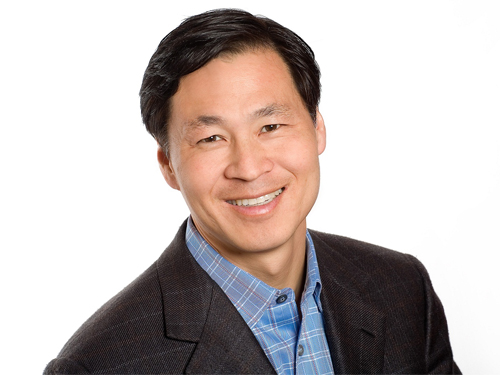 Jong Hoon Kim, a former president of Bell Labs, speaks at KAIST
Dr. Jong-Hoon Kim, who was the youngest person to serve as the President of Bell Labs and selected as one of the ten most influential Asian-Americans, will give a lecture at KAIST at 5 pm on April 28, 2015 in the KI building.
In 1992, Dr. Kim founded a telecommunication company, Yurie System. After listing the company on NASDAQ, he sold the company to Lucent Technologies for USD one billion. Dr. Kim served as the President of Lucent Technologies, taught as the University of Maryland, and subsequently served as the President of Bell Labs. He is currently the President of Kiswe Mobile.
In his lecture entitled “Aim High, Take Action,” Dr. Kim will share his personal stories and speak about ways young people can set goals for future and put those into practice. He will focus on his experiences in the United States to list his own company, Yurie System, on NASDAQ and to sell the company as well as the management innovations, which he brought about during his presidency at Bell Labs.
KAIST and Kiswe Mobile have been cooperating on a project, "Global Entrepreneurship by Doing," since 2014 to foster entrepreneurship in Korean youth. While working for Kiswe Mobile in the United States, KAIST students will have an opportunity to conduct project management, market research, and marketing, and to build local networks.
The details of the program can be found on the website of the KAIST Center for Science-based Entrepreneurship, http://eship.kaist.ac.kr.
2015.04.27 View 7208
Jong Hoon Kim, a former president of Bell Labs, speaks at KAIST
Dr. Jong-Hoon Kim, who was the youngest person to serve as the President of Bell Labs and selected as one of the ten most influential Asian-Americans, will give a lecture at KAIST at 5 pm on April 28, 2015 in the KI building.
In 1992, Dr. Kim founded a telecommunication company, Yurie System. After listing the company on NASDAQ, he sold the company to Lucent Technologies for USD one billion. Dr. Kim served as the President of Lucent Technologies, taught as the University of Maryland, and subsequently served as the President of Bell Labs. He is currently the President of Kiswe Mobile.
In his lecture entitled “Aim High, Take Action,” Dr. Kim will share his personal stories and speak about ways young people can set goals for future and put those into practice. He will focus on his experiences in the United States to list his own company, Yurie System, on NASDAQ and to sell the company as well as the management innovations, which he brought about during his presidency at Bell Labs.
KAIST and Kiswe Mobile have been cooperating on a project, "Global Entrepreneurship by Doing," since 2014 to foster entrepreneurship in Korean youth. While working for Kiswe Mobile in the United States, KAIST students will have an opportunity to conduct project management, market research, and marketing, and to build local networks.
The details of the program can be found on the website of the KAIST Center for Science-based Entrepreneurship, http://eship.kaist.ac.kr.
2015.04.27 View 7208 -
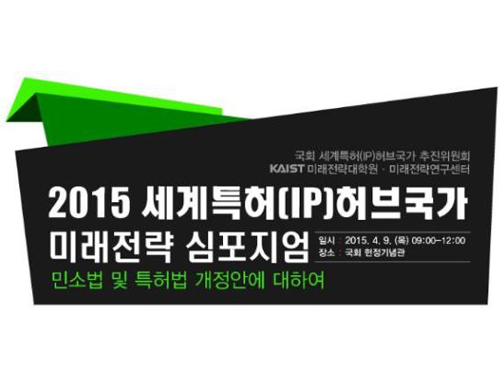 KAIST Hosts a Symposium on IPR
KAIST’s Graduate School of Future Strategy (http://futures.kaist.ac.kr) hosted a symposium entitled “Future Strategies to Grow Korea as the Hub for the World’s Intellectual Property Rights (IPRs)” under the theme of “Patent Laws and a Revised Bill for the Code of Civil Procedures” in the National Assembly’s Memorial Hall on April 9, 2015.
Experts who attended the symposium included Professor James Dator, Director of the Hawaii Research Center for Futures Studies, Sang-Wook Han, a lawyer and Vice President of Korea Intellectual Property Protection Association (KIPRA), and Min Seo, a former Chairman of Civil Law Revision Commission of the Ministry of Justice, Korea.
The event consisted of special lectures, patent law presentations, a revised bill for the code of civil procedures in patent law, and a general discussion forum. Professor Dator, the keynote speaker, addressed the future of intellectual property. San-Wook Han (KIPRA) talked about new and effective changes in Korean patent law such as the compensation against IPR violations and the reduction of legal burden of proof in IPR disputes. Min Seo from the Ministry of Justice moderated a panel of eight members, which offered an in-depth discussion on the revised bill.
A ceremony for “The Third Future Strategy Award” was also held at the symposium. Yeon-Soo Park, former Administrator of the National Emergency Management Agency, received the award for his work on the Northeast Asian International Business Center City Project which enabled the construction of Incheon International Airport and Songdo International City.
2015.04.09 View 12504
KAIST Hosts a Symposium on IPR
KAIST’s Graduate School of Future Strategy (http://futures.kaist.ac.kr) hosted a symposium entitled “Future Strategies to Grow Korea as the Hub for the World’s Intellectual Property Rights (IPRs)” under the theme of “Patent Laws and a Revised Bill for the Code of Civil Procedures” in the National Assembly’s Memorial Hall on April 9, 2015.
Experts who attended the symposium included Professor James Dator, Director of the Hawaii Research Center for Futures Studies, Sang-Wook Han, a lawyer and Vice President of Korea Intellectual Property Protection Association (KIPRA), and Min Seo, a former Chairman of Civil Law Revision Commission of the Ministry of Justice, Korea.
The event consisted of special lectures, patent law presentations, a revised bill for the code of civil procedures in patent law, and a general discussion forum. Professor Dator, the keynote speaker, addressed the future of intellectual property. San-Wook Han (KIPRA) talked about new and effective changes in Korean patent law such as the compensation against IPR violations and the reduction of legal burden of proof in IPR disputes. Min Seo from the Ministry of Justice moderated a panel of eight members, which offered an in-depth discussion on the revised bill.
A ceremony for “The Third Future Strategy Award” was also held at the symposium. Yeon-Soo Park, former Administrator of the National Emergency Management Agency, received the award for his work on the Northeast Asian International Business Center City Project which enabled the construction of Incheon International Airport and Songdo International City.
2015.04.09 View 12504 -
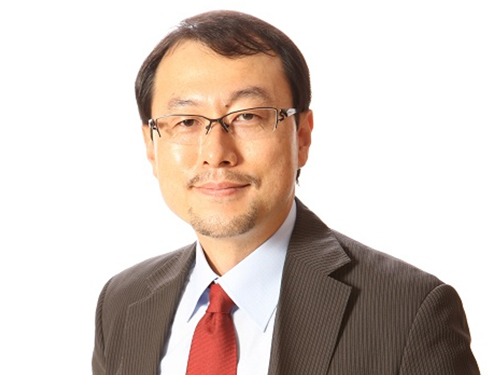 Professor Sangyong Jon Appointed Fellow of AIMBE
Professor Sangyong Jon of the Department of Biological Sciences at KAIST has been appointed a member of the American Institute for Medical and Biological Engineering (AIMBE) fellowship.
Established in 1991, AIMBE is a non-profit organization based in Washington, D.C., representing 50,000 individuals and the top 2% of medical and biological engineers. AIMBE provides policy advice and advocacy for medical and biological engineering for the benefit of humanity. It has had about 1,500 fellows over the past 25 years. Among the members, only 110 are non-American nationalities.
Following the appointment of Dr. Hae-Bang Lee, the former senior researcher at the Korean Research Institute of Chemical Technology, and Distinguished Professor Sang Yup Lee of the Department of Chemical and Biomolecular Engineering at KAIST, Professor Jon is the third Korean to become an AIMBE fellow. He had an induction ceremony for the appointment of his fellowship at the AIMBE’s Annual Event held on March 15-17, 2015 in Washington, D.C.
An authority on nanomedicine, Professor Jon has developed many original technologies including multi-functional Theranostics nano particles for the diagnosis and treatment of diseases. He received the Most Cited Paper Award from Theranostics, an academic journal specialized in nanomedicine, last February.
Additionally, Professor Jon is a leading researcher in the field of translational medicine, using a multi-disciplinary, highly collaborative, “Bench to Bedside” approach for disease treatment and prevention. He created a biotechnology venture company and transferred research developments to the industry in Korea.
2015.03.12 View 15103
Professor Sangyong Jon Appointed Fellow of AIMBE
Professor Sangyong Jon of the Department of Biological Sciences at KAIST has been appointed a member of the American Institute for Medical and Biological Engineering (AIMBE) fellowship.
Established in 1991, AIMBE is a non-profit organization based in Washington, D.C., representing 50,000 individuals and the top 2% of medical and biological engineers. AIMBE provides policy advice and advocacy for medical and biological engineering for the benefit of humanity. It has had about 1,500 fellows over the past 25 years. Among the members, only 110 are non-American nationalities.
Following the appointment of Dr. Hae-Bang Lee, the former senior researcher at the Korean Research Institute of Chemical Technology, and Distinguished Professor Sang Yup Lee of the Department of Chemical and Biomolecular Engineering at KAIST, Professor Jon is the third Korean to become an AIMBE fellow. He had an induction ceremony for the appointment of his fellowship at the AIMBE’s Annual Event held on March 15-17, 2015 in Washington, D.C.
An authority on nanomedicine, Professor Jon has developed many original technologies including multi-functional Theranostics nano particles for the diagnosis and treatment of diseases. He received the Most Cited Paper Award from Theranostics, an academic journal specialized in nanomedicine, last February.
Additionally, Professor Jon is a leading researcher in the field of translational medicine, using a multi-disciplinary, highly collaborative, “Bench to Bedside” approach for disease treatment and prevention. He created a biotechnology venture company and transferred research developments to the industry in Korea.
2015.03.12 View 15103